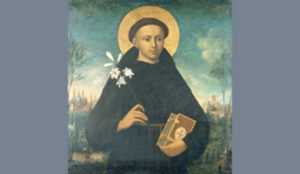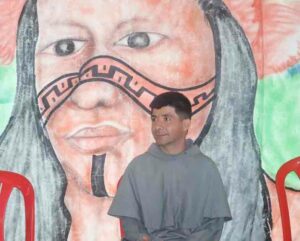St. Anthony and Contemplation in a Changing World
“We are assailed by doubts, and weighed down by uncertainties – release our hearts, to journey towards you with hope.”
I wonder if you’re feeling somewhat discombobulated these days. One dictionary definition of this delightful word is: confused and disconcerted. That might be a fairly accurate description not only for many experiencing and witnessing the goings-on in the world today, but perhaps also for our global collective state of mind.
I’m not just talking about the events experienced and witnessed over the past year, but more about our reaction to them. Events seem to move at such a rapid pace and with such immediate consequences that we’re unable to process them with the clarity of mind and serenity of spirit needed. Hence the confusion. And being denied the time and disposition to reflect with calmness and discernment on all that’s happening in our world, causes many to lapse into a default reaction of fear and anger. Hence being disconcerted.
Another definition of discombobulate is, to make uncomfortable. And perhaps this definition sums it all up for us. We are uncomfortable because we seem no longer able to rely on our old certainties and trusted convictions to interpret global events for us and to help us find meaning in their local impact. We are tempted to negative thinking, imagine extreme scenarios. Because we are unclear about where it’s all going or how it will turn out, and in the midst of what seems chaos, we long for stability and order. We look for a fixed anchor in the swirl of a seemingly unstable reality and an uncertain future which leaves us feeling powerless and overwhelmed.
However you may be thinking, feeling, and reacting to these events of our time, it’s important that you don’t lapse into confused thinking and so succumb to extreme responses — such as despair, cynicism, taking up a fixed ideological position, or seeking a simplistic answer to the questions raised by your thoughts and feelings.
Maintaining a prudent and balanced perspective on these events and their meaning for us entails returning to the narratives of our faith, and finding therein the resources and inspiration to direct our thoughts and guide our response. Our faith history is a rich resource for us to meditate upon, seeing in it the unbroken pattern of God’s faithful presence strengthening and guiding men and women of every age, to be voices of hope and wisdom in the midst of social and political upheaval.
The pastoral constitution, Gaudium et Spes, from the Second Vatican Council, urges the constant task of scrutinising the signs of the times and interpreting them in the light of the gospel. Imbued with the light of the Gospel, we discern the underlying processes and historical patterns at work within the events of our times, doing so soberly, and with faith in God’s loving presence and action at the heart of all reality.
This is a time for change, a ‘kairos’ moment in which we are called to a critical and honest discernment of our response to current events, and how the Lord is calling us to a deeper faith and love.
A faith that sees beyond surface phenomena to the grace present in all things and situations. A love that is magnanimous and embraces even that which threatens me and causes me discomfort. Such a discernment requires that we pray contemplatively and foster a contemplative attitude in all things. Perhaps the words of the German theologian Karl Rahner are being realised through the challenges we are now experiencing: “The Christian of the future will be a mystic or will not exist at all.”
Mysticism is born of a contemplative spirit and is a faith that is nourished by experiences of God’s holy presence within us and within all reality. It is the grace to spiritually intuit the hidden depths within myself, others, and all creation through a constant habit of sacred awareness.

While reflecting recently on some of St. Anthony of Padua’s writings, I came across some words that helped me to come to an important insight into what it means to be contemplative. In a simple way, he points directly to what we need to be alert to if we wish to be alive to God’s presence within us. A contemplative disposition, in silent prayer and in being in the world, is one that gazes steadily at reality until we see beyond the surface phenomena, and in our spirits begin to intuit the deeper reality of God’s loving presence at the heart of all things. And then being moved by this encounter, responds in love and awe to all that is a manifestation of God’s self-communication in created reality; and then reciprocally and immediately we are given the capacity for an even greater openness to being touched and transformed by God’s loving presence in all that is.
St. Anthony speaks of this same intentional movement of the will and the spirit, where his focus is God and his point of reference is the self. The secret is that in being faithful to our true selves, we begin to carry God in our hearts. Our true identity is in Christ and to be found in the mystery of God’s presence dwelling within us.

To be continued….
– friar Terence Bateman OFM Conv.





